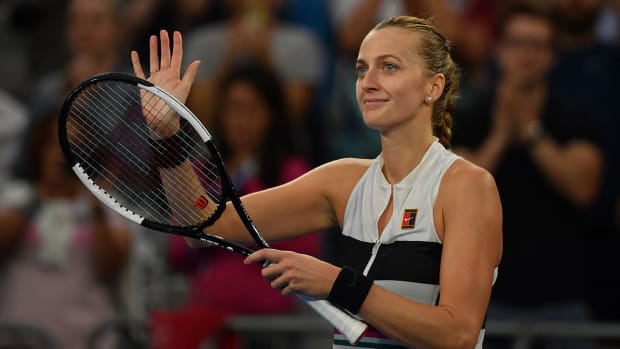Tuktamysheva takes women's lead at figure skating worlds
SHANGHAI (AP) Elizaveta Tuktamysheva has been so far ahead of the rest of the women's figure skating field this season, she didn't think twice about adding a much more difficult element to her repertoire of high-flying jumps.
It was far riskier to attempt it in the most important event of the year.
The 18-year-old Russian landed a triple axel on her first leap of the figure skating world championships on Thursday, opening up a big lead over the rest of the field after the short program.
''When I landed the triple axel, I got goosebumps and I thought, `Is this a dream or did I really just do the triple axel at the world championships?''' Tuktamysheva said.
In the pairs event, Canadian duo Meagan Duhamel and Eric Radford wrapped up a perfect season by holding off two Chinese teams in the free skate to capture the gold. It was Canada's first pairs title since Jamie Sale and David Pelletier won in 2001.
Only a handful of women skaters have successfully landed a triple axel in international competition, among them Tonya Harding, Midori Ito and Mao Asada. Tuktamysheva landed the difficult jump in one of the biggest competitions of her career after only practicing it for a couple months.
''It's 50 percent I could land it and 50 percent I could miss it, anything could happen with this jump,'' Tuktamysheva said. ''However, I think that figure skating needs to develop and many girls will do the triple axel in the future. You have to do difficult elements and you cannot stagnate.
''Maybe we will even be doing quad (jumps) in the future, who knows?''
A year after inconsistent results kept her off the Russian team for the Sochi Olympics, Tuktamysheva is having a banner season. She has captured seven titles in nine events, including the European Championships and Grand Prix Finals, and is now closing in on her first world title.
Skating to Maurice Ravel's ''Bolero,'' Tuktamysheva dazzled not just with her jumps - her footwork was crisp and her spins tight and blisteringly fast.
She scored 77.62 points, the third-highest short program tally since the International Skating Union changed its judging system in 2004. Sixteen-year-old Elena Radionova of Russia was more than eight points behind in second, while Satoko Miyahara of Japan finished third on her 17th birthday.
While the Russians were out in front as expected, the skaters believed to be their biggest challengers, the Americans, faltered.
Both Gracie Gold and Ashley Wagner struggled with their opening triple lutz-triple toeloop combinations. Gold, the bronze medalist in Sochi, took an extra step on her triple lutz and didn't perform the second jump, and three-time U.S. champion Wagner fell on her toeloop.
Gold was in eighth place after the short program, just behind American teammate Polina Edmunds. Wagner was in 11th place.
For Gold, it was yet another disappointment in a season she'd rather forget. After pulling out of the Grand Prix Finals in December with a stress fracture in her foot, she failed to defend her title at U.S. Nationals and finished fourth at the Four Continents Championships.
''Knowing that I can be in the top and I'm not there is frustrating,'' Gold said. ''I've just had so many ups and so many downs, it's not like me.''
Wagner, too, was hoping for more consistency to break the United States' nine-year medal drought at worlds.
''Today was a horrible day, there's no other way to say it,'' Wagner said.
Duhamel and Radford, who are two-time world bronze medalists, overcame a shaky performance to take home the pairs gold.
After a seventh-place finish at the Sochi Games last year, the pair decided to continue their careers and skate another year - and haven't lost since. They've won all six international events they've entered this season, including the Grand Prix Finals and Four Continents.
''This is a very personal victory. Every single victory along the way this season had a very special meaning,'' Duhamel said.
Sui Wenjing and Han Cong of China finished second, and 35-year-old veterans Pang Qing and Tong Jian, competing in their 16th world championships, took home the bronze.
Pang and Tong, who came out of retirement this year to finish their careers in Shanghai, now have six world medals (two gold, one silver, three bronze) to go with their silver medal from the 2010 Vancouver Olympics.
''I fulfilled (my partner's) wishes to come back to the rink,'' Tong said, before adding with a smile, ''I certainly hope Pang Qing will not drag me back to the rink once again.''




